Introduction
In a world where health and wellness are more critical than ever, specialized diets have emerged as a powerful tool for enhancing individual well-being and workplace productivity. These meticulously crafted nutritional plans cater to specific health needs, lifestyle preferences, and ethical beliefs, paving the way for improved health outcomes.
From gluten-free diets essential for those with celiac disease to plant-based diets that reflect a commitment to sustainability, understanding the diverse spectrum of specialized diets is vital for HR Benefits Managers. By championing these dietary approaches within organizations, companies can foster a culture that prioritizes employee health and engagement.
With the right support and resources, including personalized coaching from experts like Foresight Health Coaching, organizations can empower their teams to embrace these dietary changes, ultimately leading to a more vibrant and productive workplace. As the journey into specialized nutrition unfolds, the potential for transformative impact on both individual health and organizational success becomes evident.
Defining Specialized Diets: An Overview
Tailored meal plans signify a crucial method to nutrition, utilizing a specialized diet that is carefully designed to meet particular wellness requirements or lifestyle choices. These meal plans differ from standard nutritional guidelines by emphasizing a specialized diet that focuses on specific food categories or nutrients aimed at improving well-being, managing medical issues, or enhancing overall wellness. For example, individuals diagnosed with celiac disease must adhere to a gluten-free regimen to avoid serious medical issues.
Similarly, athletes often adopt high-protein diets to facilitate muscle recovery and optimize performance. Furthermore, the experiences of young adults with flexitarianism emphasize a rising trend toward adaptable eating habits that correspond with wellness objectives. According to a YouGov survey, motivations for current eating habits vary, with many individuals seeking food choices that support their well-being and performance.
This is where Foresight Health Coaching steps in. By providing tailored online guidance and strategic wellness plans, we enable employees to adopt customized eating habits that can greatly improve their involvement and efficiency at work. Our focus is on the intangible value — equipping your team with tailored coaching they can’t easily access on their own, translating into a competitive advantage for your firm.
By investing in employee well-being through these specialized diet plans, HR Benefits Managers can foster a culture of retention, attraction, and performance, ultimately creating a more engaged and productive workforce. Grasping the subtleties of a specialized diet is crucial for anyone striving to enhance well-being and workplace efficiency. With Foresight Health Coaching, you can guide your organization toward flourishing well-being and performance.
We invite you to connect with us today to explore how we can make a difference together.
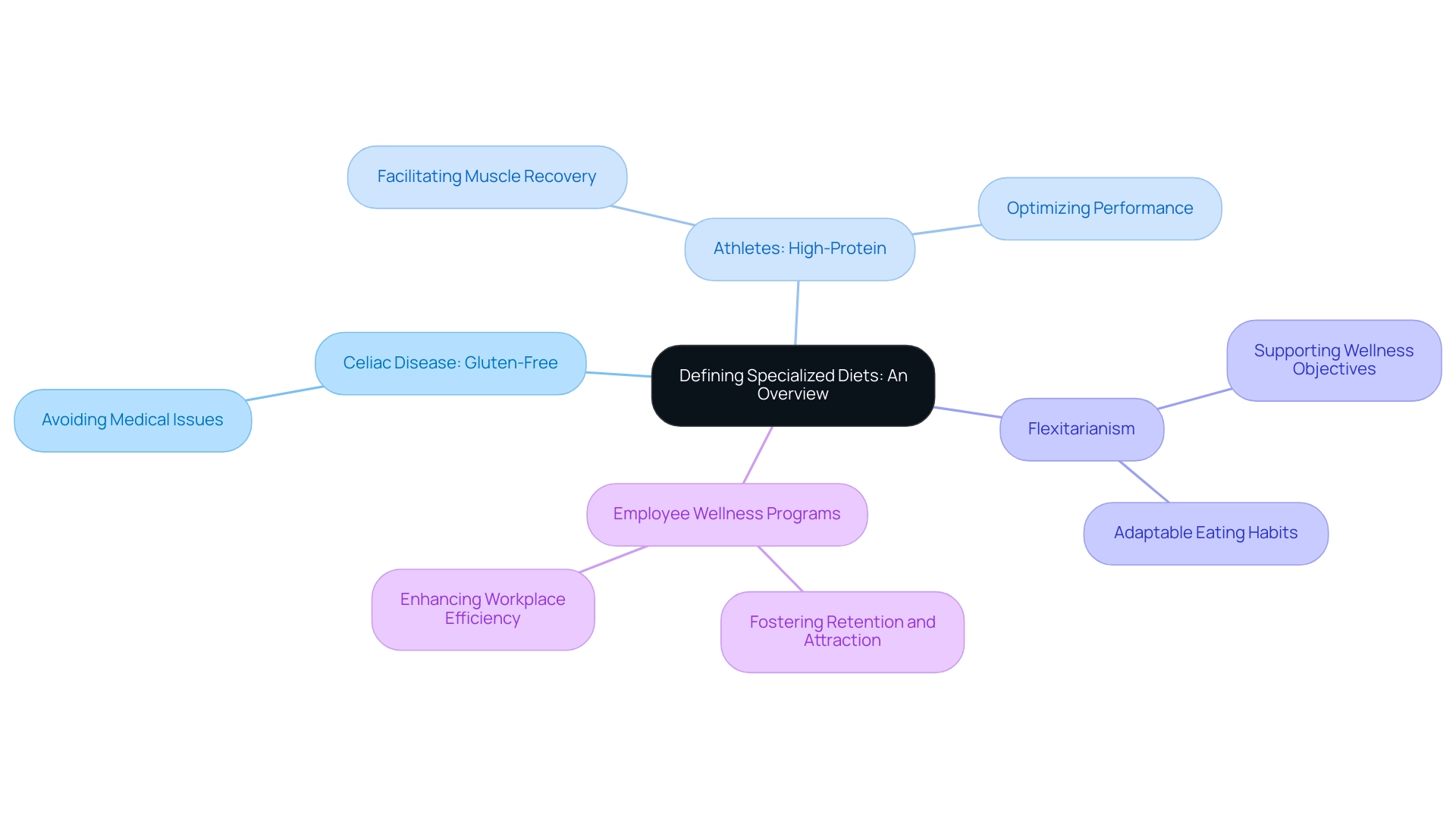
Exploring Different Types of Specialized Diets and Their Benefits
In today's varied workplace, following a specialized diet plays a crucial role in promoting health and improving performance. Comprehending these nutritional plans, particularly the specialized diet options, can enable HR Benefits Managers to assist their teams efficiently. Common specialized diets include:
- Gluten-Free Diet: This diet is crucial for individuals diagnosed with celiac disease or gluten sensitivity. By eliminating gluten-containing grains, it helps prevent digestive complications and fosters overall health. Recent studies show that adherence to a gluten-free eating plan in 2024 remains significant, with statistical analysis indicating a strong association between gluten-free eating plan adherence and improved laboratory test outcomes, underscoring its necessity for those affected. A relevant case study titled 'Nutritional Imbalances in Adult Celiac Patients' highlights the importance of balanced nutrition for individuals adhering to a gluten-free regimen, emphasizing the need for ongoing nutritional assessment and intervention.
- Dairy-Free Approach: Frequently adopted by individuals with lactose intolerance or dairy allergies, this regimen mitigates discomfort and reduces inflammation linked to dairy consumption. The benefits of a dairy-free lifestyle extend beyond symptom relief; they can lead to improved energy levels and cognitive clarity, thus enhancing workplace productivity.
- Ketogenic Approach: This low-carbohydrate, high-fat regimen induces a state of ketosis, which can aid in weight loss and enhance metabolic well-being. The advantages of this eating plan also contribute to heightened focus and efficiency at work.
Furthermore, it is important to mention that in 2023, there has been a significant rise in protein intake among individuals in the U.S., classified by type, which indicates a growing trend towards specialized diets aimed at improving overall wellness. Each of these nutritional plans, like a specialized diet, presents unique advantages, such as boosting energy, reducing inflammation, and enhancing cognitive function. By prioritizing nutritional awareness within the workplace, HR Benefits Managers can cultivate an environment that not only encourages well-being but also enhances performance.
As Ewa Malecka Wojciesko highlights, continuous nutritional evaluation and intervention are vital for optimal employee health, particularly for those following a specialized diet. This proactive approach not only improves individual wellness outcomes but also cultivates a more engaged and productive workforce.
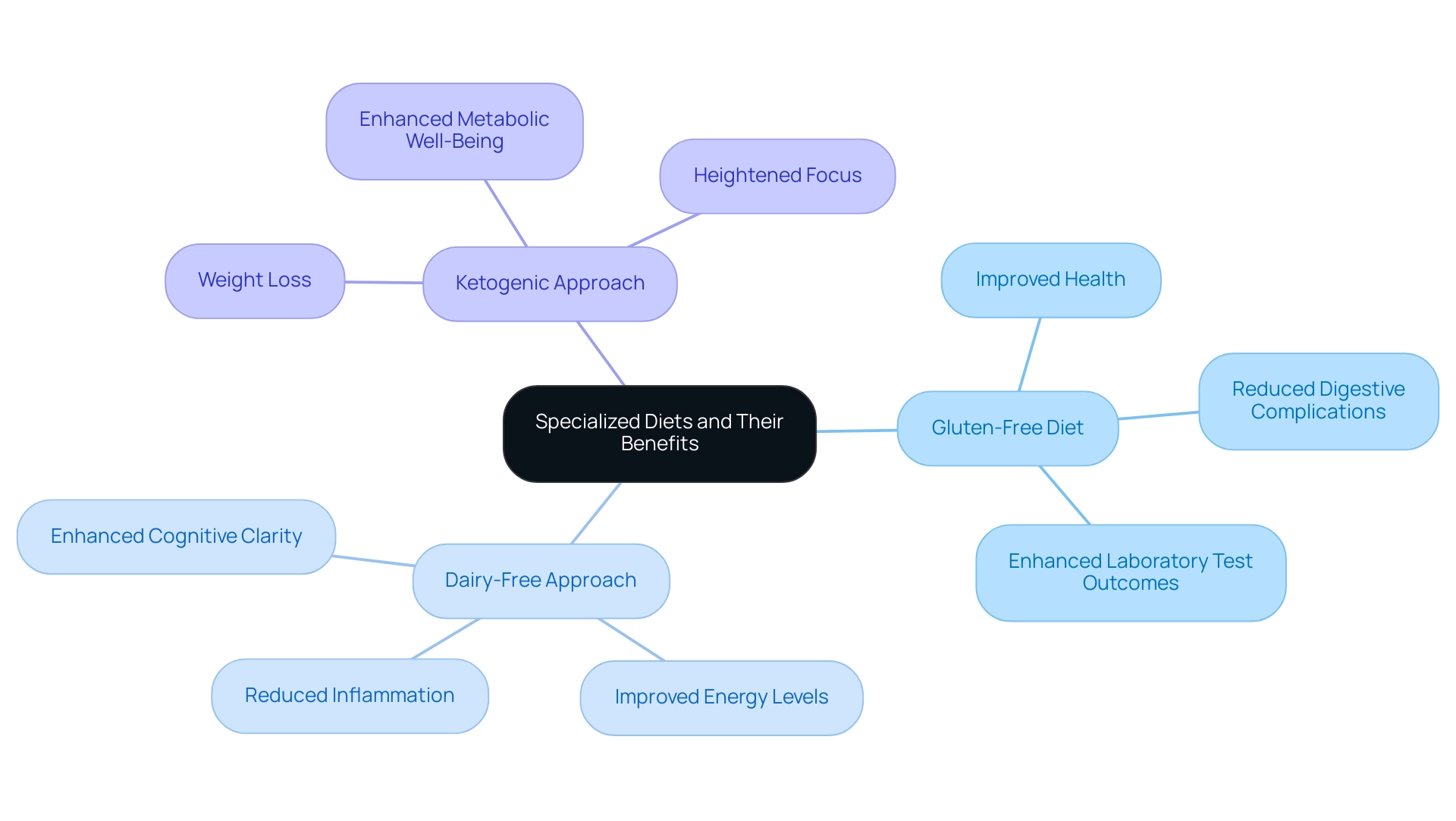
Why Choose a Specialized Diet? Understanding Motivations and Needs
Individuals choose specialized diets for various reasons, all of which have significant effects on their well-being and workplace performance. One main motivator is medical conditions; individuals often adopt specific food restrictions to manage chronic illnesses such as diabetes or hypertension. These nutritional modifications can result in significant enhancements in wellness outcomes, demonstrating the influence of nutrition in disease management.
Moreover, food allergies force individuals to avoid certain foods, changing dietary choices from simple preferences into crucial measures that prevent severe reactions.
Lifestyle choices also play a pivotal role. Many adopt a specialized diet, such as vegetarianism or veganism, demonstrating a wider dedication to wellness and ethical principles. According to recent statistics, the top three meal plans gaining traction are:
- Plant-based options
- Those focused on fruits and vegetables
- Those emphasizing whole grains, beans, and seeds
This trend is gaining momentum, particularly with the expected popularity of plant-based diets in 2024, propelled by their wellness advantages and environmental impact. As indicated by YouGov, motivations for current eating habits often include wellness considerations, ethical beliefs, and personal preferences. By providing personalized coaching and guidance, companies can support employees in making these nutritional transitions, ultimately fostering lasting lifestyle changes that empower their well-being.
Experienced coaches utilize evidence-based techniques to ensure that these transitions are effective and sustainable. Grasping these varied motivations is crucial for fostering a supportive workplace atmosphere, where employee well-being directly correlates with productivity and overall performance. By prioritizing a specialized diet along with these dietary considerations, HR Benefits Managers can cultivate a culture of well-being that empowers employees to thrive.
Adopting a specialized diet not only indicates an increasing understanding of nutrition's contribution to well-being and sustainability but also emphasizes the significance of proactive involvement and knowledgeable support in improving workplace performance. Let’s discuss how we can help you thrive in the modern world while learning from the wisdom of the past. Contact us today to schedule a consultation!
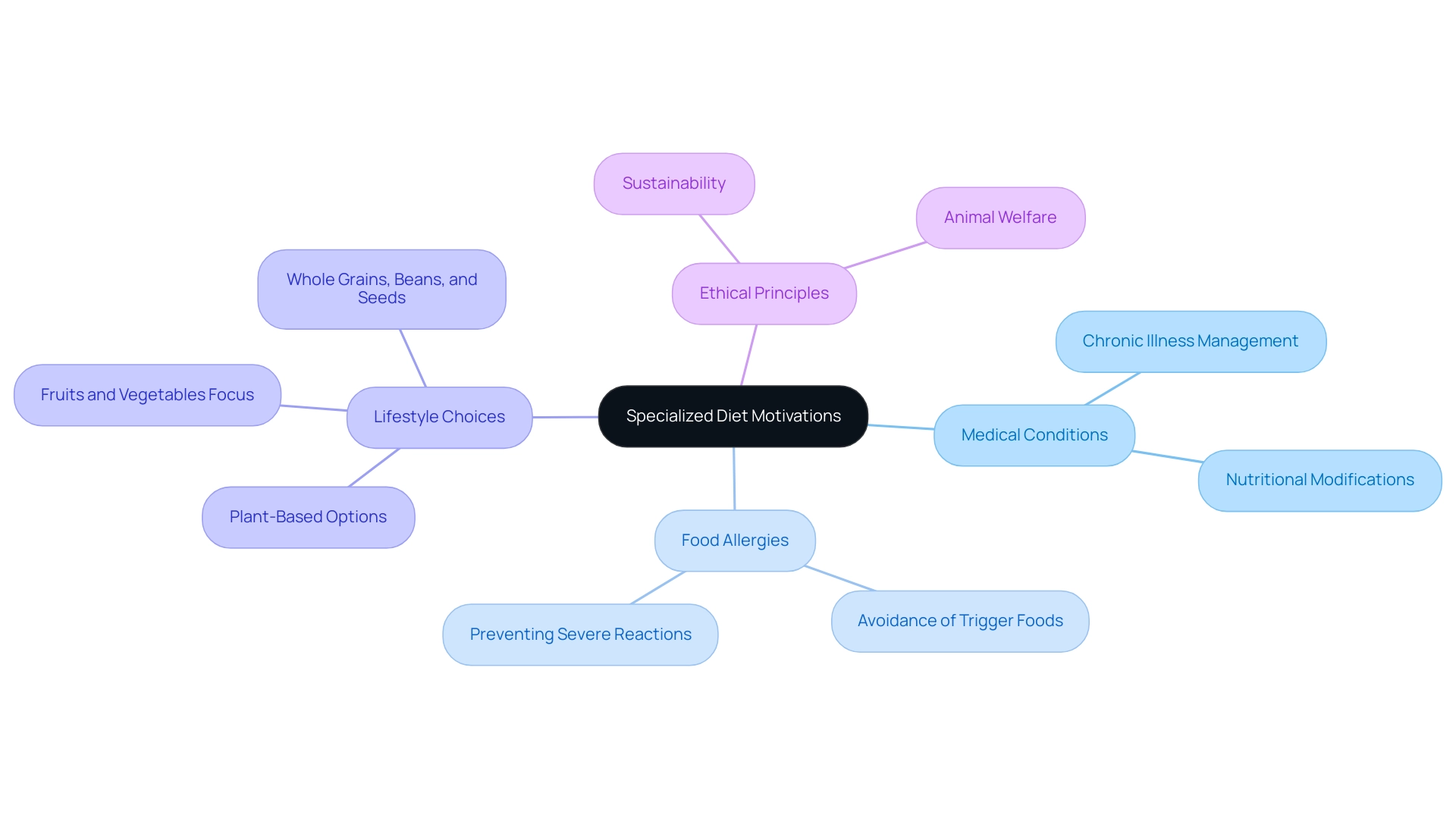
Navigating the Transition: Challenges and Tips for Adopting a Specialized Diet
Transitioning to a specialized diet can indeed pose significant challenges, yet these hurdles can be overcome with the right strategies and support, particularly through the specialized diet coaching services offered by Foresight Health Coaching. One key challenge is navigating social situations. Dining out or participating in events while maintaining specific eating restrictions can feel daunting.
It's crucial to communicate your dietary needs to hosts and seek out restaurants that offer accommodating menus. Remember, your well-being should take precedence, and many establishments are eager to assist.
Another noteworthy challenge is achieving nutritional balance. Ensuring that your diet remains wholesome while intentionally avoiding certain food groups can be complex.
This is where Foresight's individualized coaching comes into play; engaging with a dietitian or health coach can provide invaluable personalized guidance tailored to your unique circumstances, especially when it involves a specialized diet. As Ramazan Çakmakçı aptly states in Foods of the Future: Challenges, Opportunities, Trends, and Expectations, navigating changes in nutrition requires both knowledge and adaptability. This is particularly relevant when considering the nutritional data compiled for 185 liolaemid species, emphasizing the diversity of nutritional needs and the importance of tailored nutritional approaches.
To illustrate real-world challenges, consider the case studies on red meat consumption: in Kenya, households reported consuming beef an average of five times per week, while in Ghana, red meat was consumed less frequently but in larger portions per serving. These examples highlight the varying cultural practices that can impact food transitions.
To facilitate a smoother transition, consider these empowering tips:
- Start gradually by replacing one food group at a time to allow yourself to adjust without feeling overwhelmed.
- Educate yourself about alternative foods that align with your nutritional needs; knowledge is a powerful ally in this journey.
- Seek support from friends, family, or online communities. Exchanging experiences and suggestions can offer essential motivation and boost your resilience.
Foresight Coaching also provides corporate memberships that encompass in-person wellness discussions, extensive pantry services, and access to our wellness app, all aimed at assisting employees in their dietary transitions and overall well-being. By adopting these strategies and grasping the intricacies demonstrated by practical examples, you can navigate the challenges of a specialized diet. With Foresight Health Coaching at your side, you have the opportunity to turn potential obstacles into pathways for improved health and well-being.
Contact us today to learn more about how our tailored programs can support your journey.
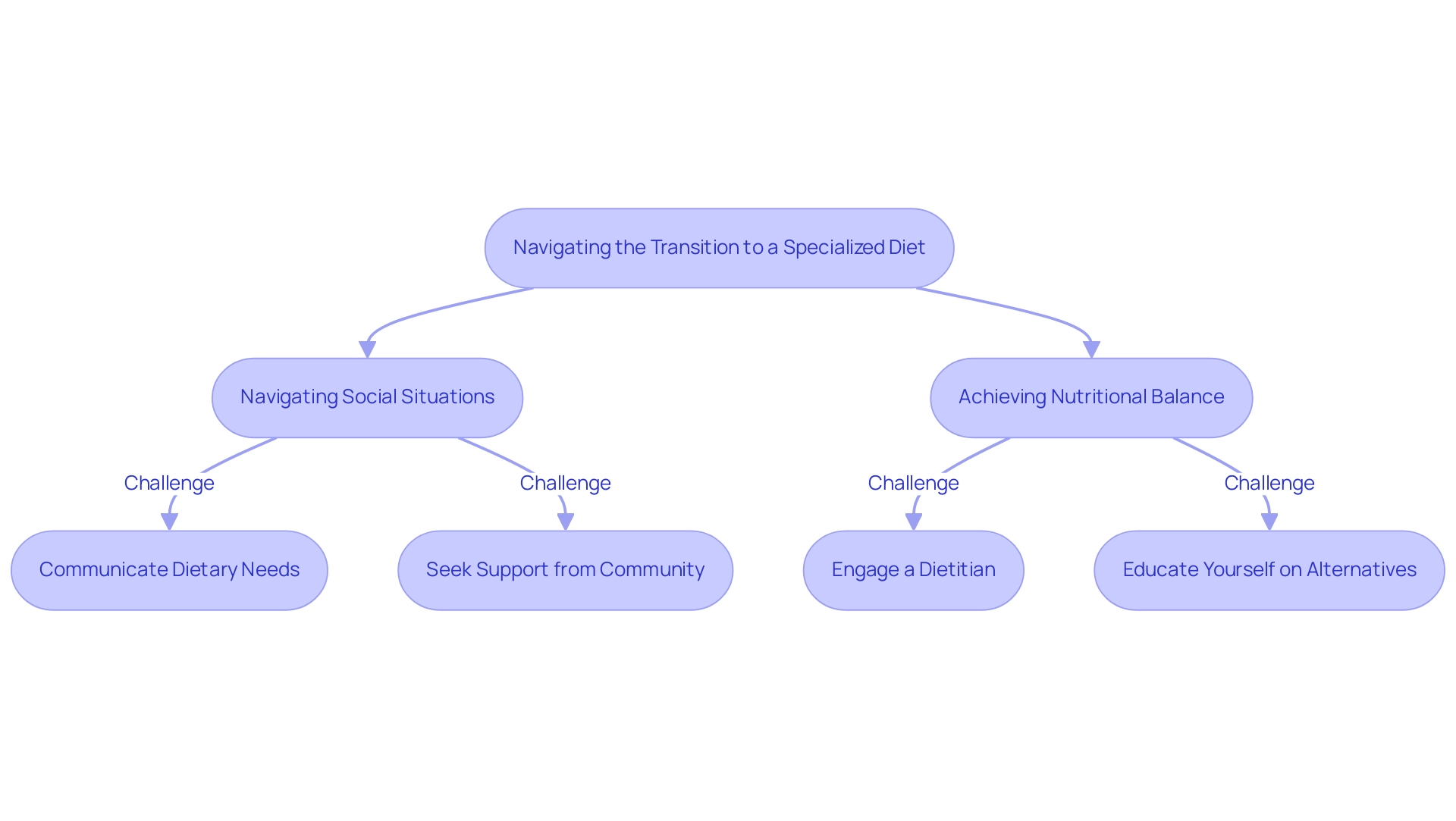
Finding Support: Resources for Managing Specialized Diets
Navigating a specialized diet can be challenging, but numerous resources are available to provide essential support for individuals striving to maintain their nutritional goals. By partnering with Foresight Health Coaching, HR Benefits Managers can take the first step towards enhancing team culture and promoting employee wellness.
- Online Communities: The rise of dedicated websites and social media groups creates vibrant forums where individuals can share experiences, exchange recipes, and offer tips that foster a sense of belonging and motivation. These platforms often serve as a lifeline, especially for those feeling isolated in their nutritional journeys.
- Professional Guidance: Working with a registered dietitian is invaluable, as they can provide personalized advice and create customized meal plans that align with individual wellness objectives. Their expertise ensures that dietary choices are not only effective but also sustainable.
- Workplace Wellness Programs: Organizations increasingly recognize the significance of well-being in the workplace. Many now offer comprehensive wellness programs that include nutritional counseling and support groups. By integrating Foresight Health Coaching’s corporate partnership, these initiatives can cultivate a culture of well-being among employees, enhancing productivity and morale. Specifically, our partnership provides tailored resources and support that directly address common barriers faced by employees, such as lack of time and competing priorities.
Using these resources efficiently can greatly enhance compliance with tailored meal plans, ultimately resulting in improved health results and heightened workplace productivity. According to a recent survey, common barriers to maintaining a healthy lifestyle include lack of time and competing priorities, which can hinder adherence to a specialized diet. Additionally, as Edwina A. Wambogo, an expert in the field, emphasizes, "The percentage of adults aged 20 and over who consumed any fruit increased with increasing family income."
This highlights the importance of addressing socioeconomic factors in dietary choices.
By prioritizing these resources and considering a partnership with Foresight Health Coaching, HR Benefits Managers can play a crucial role in supporting their teams' wellness journeys. Contact us now to explore our free 7-day trial of our transformative health coaching app and discover how we can help nurture a stronger and more resilient team culture.
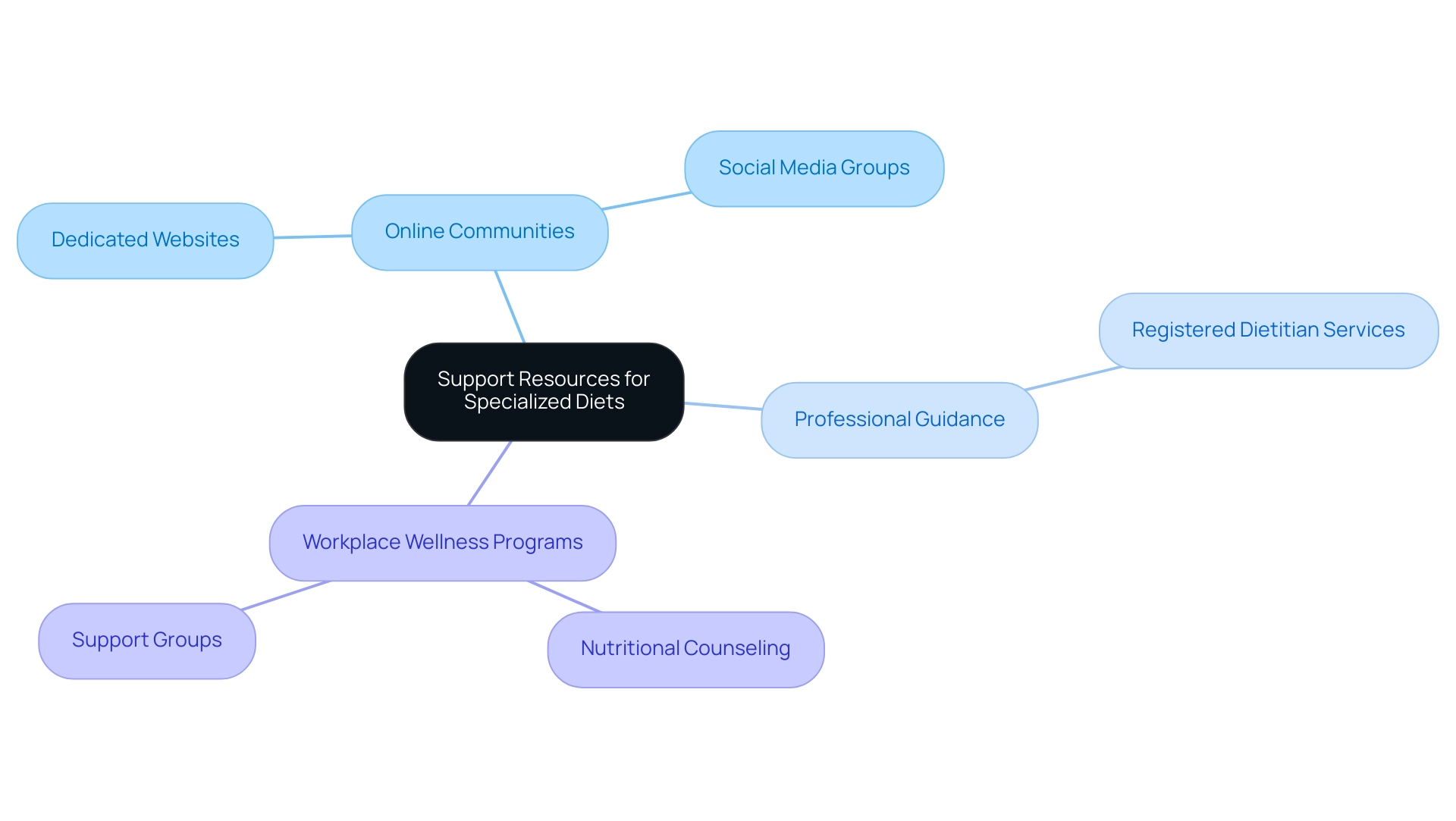
Conclusion
Embracing specialized diets is crucial for enhancing health and well-being in the workplace. By understanding various diets—like gluten-free, dairy-free, and plant-based—HR Benefits Managers can effectively support employee health and productivity. These diets cater to specific health needs and lifestyle choices, enabling individuals to manage chronic conditions and improve overall performance.
Motivations for adopting specialized diets vary, from health management to ethical beliefs. Creating an environment that encourages these dietary changes through personalized coaching empowers employees to make lasting improvements to their health.
Navigating challenges such as social situations and nutritional balance is manageable with the right support systems in place. Resources like online communities and professional guidance enhance adherence to specialized diets, leading to better health outcomes. Investing in wellness programs, including partnerships with experts like Foresight Health Coaching, helps cultivate a culture of health that drives employee engagement and productivity.
Now is the time for HR Benefits Managers to take action by integrating specialized diets into their health strategies. Prioritizing these initiatives fosters a workplace that emphasizes well-being and drives long-term success. This commitment is essential for creating a thriving environment where every employee can flourish.
Frequently Asked Questions
What are tailored meal plans?
Tailored meal plans are specialized diets designed to meet specific wellness requirements or lifestyle choices, differing from standard nutritional guidelines by focusing on particular food categories or nutrients to improve well-being, manage medical issues, or enhance overall wellness.
Why are specialized diets important for certain individuals?
Specialized diets are crucial for individuals with specific health conditions, such as celiac disease, which requires a gluten-free diet to avoid serious health issues, or athletes who may adopt high-protein diets to aid muscle recovery and optimize performance.
What is flexitarianism and its relevance to eating habits?
Flexitarianism is an adaptable eating habit that aligns with wellness objectives, reflecting a rising trend among young adults who seek food choices that support their well-being and performance.
How does Foresight Health Coaching support employees?
Foresight Health Coaching provides tailored online guidance and strategic wellness plans, helping employees adopt customized eating habits that can improve engagement and efficiency at work.
What benefits can HR Benefits Managers expect from investing in specialized diet plans?
By investing in specialized diet plans, HR Benefits Managers can foster a culture of retention, attraction, and performance, leading to a more engaged and productive workforce.
What are some common specialized diets mentioned in the article?
Common specialized diets include: Gluten-Free Diet: Essential for individuals with celiac disease or gluten sensitivity. Dairy-Free Approach: Beneficial for those with lactose intolerance or dairy allergies. Ketogenic Approach: A low-carbohydrate, high-fat diet that can aid in weight loss and enhance metabolic well-being.
What are the benefits of a gluten-free diet?
The gluten-free diet helps prevent digestive complications for individuals with celiac disease and is associated with improved health outcomes, emphasizing the importance of balanced nutrition and ongoing assessment.
How does a dairy-free diet affect individuals?
A dairy-free diet can alleviate discomfort linked to lactose intolerance and dairy allergies, potentially leading to improved energy levels and cognitive clarity, thus enhancing workplace productivity.
What advantages does the ketogenic diet offer?
The ketogenic diet can promote weight loss, enhance metabolic well-being, and contribute to increased focus and efficiency at work.
Why is continuous nutritional evaluation important for employees on specialized diets?
Continuous nutritional evaluation and intervention are vital for optimal employee health, particularly for those on specialized diets, as they can improve individual wellness outcomes and foster a more engaged and productive workforce.

